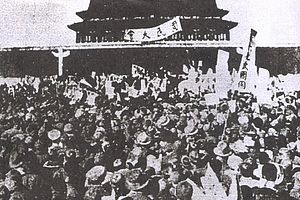This year, Western media outlets are focusing on the 25th anniversary of the Tiananmen protests, a milestone the Chinese government has pointedly ignored. Yet a previous round of massive student-led demonstrations is proudly embraced by Beijing. Yesterday, China celebrated the 95th anniversary of the May Fourth Movement, which Xi Jinping described as an early ancestor of his Chinese dream.
The May Fourth Movement draws its name from a student-led protest movement that began (naturally) on May 4, 1919. This protest movement drew on a storm of popular outrage against the Treaty of Versailles, which officially ended World War I. Chinese were outraged to learn that the treaty ceded Shandong Peninsula, which had been under German occupation, to Japan rather than returning it to China. In response, students organized massive protests denouncing both the imperialists who ignored China’s sovereignty and China’s own government, which was too weak to resist their demands.
To put it another way, the May Fourth protestors were both extremely patriotic and extremely unpatriotic — they cared deeply about China’s sufferings at the hand of the imperialist powers, but they also placed the blame for China’s problems squarely on both the current government and on Chinese culture itself. The protestors were advocating for China, but also saw foreign ideologies and systems as the cure for all China’s ills.
Given these tensions, official remembrances of the May Fourth Movement are always interesting. On one hand, the movement is seen as the origins of the Chinese Communist Party itself — one of the leading figures in the protests, Chen Duxiu, the dean of Peking University, would later help found the Chinese Communist Party. Yet at its heart, the May Fourth Movement also carries subversive messages, just as the Tiananmen Protests do.
First, there’s the obvious fact that the movement involved mass anti-government protests by thousands of students, something Beijing would never permit today. But on a deeper level, May Fourth ideology is an awkward fit for the CCP. The movement emphasized freedom of information, especially foreign information, as tools to overthrow the status quo and rebuild China’s culture from the ground up. This idea obviously is not in line with CCP ideals, where anything not promoting socialism’s “core values” is subject to censorship. Tony Saich, in The Rise to Power of the Chinese Communist Party, noted that, from the very beginning, there was tension between the authoritarian party organization system an “the antidespotic, iconoclastic thrust of the May Fourth Movement.” It’s telling that May Fourth leader Chen Duxiu was later forcibly ousted from the very party he co-founded.
Given these tensions, how did Xi’s government in particular address the legacy of May Fourth on the 95th anniversary of the protests?
In honor of the anniversary, Xinhua featured a prominent op-ed on its Chinese-language home page, titled “Let the Brilliance of the May Fourth Spirit Shine Even Brighter — Studying and Implementing the Spirit of Secretary Xi Jinping’s Important May Fourth Speech.” In the title, we already see the May Fourth Movement being equated directly to Xi’s interpretation of the event.
And what is Xi’s interpretation? “The best way for young people to commemorate the May Fourth Movement,” Xi told students at Peking University, involves first and foremost being “under the Party’s leadership.” The end takeaway from Xi’s “deep reflection on the glorious history of the May Fourth Movement” is an exhortation for young Chinese “to take up the heavy responsibility given to them by the Party and the people, and create a splendid period in the grand historical process of realizing the Chinese dream.”
The May Fourth movement, according to this reading, is nothing less (and nothing more) than an early precursor of Xi’s Chinese dream. It was the May Fourth movement, Xinhua tells us, that inspired China’s young people as well as the masses to “change the fate of their country and their nation.” Guided by this desire to save China, the students were willing to sacrifice everything to follow the path laid out by the Party leaders. In this context, Xinhua’s editorial equates spreading the May Fourth spirit directly with carrying out the tasks assigned by Party Secretary Xi.
The May Fourth spirit, as defined by Xinhua, consists of four core ideals: patriotism, progress, democracy, and science. These four ideals remain the “core values” Chinese should hold fast to and implement today, the commentary said. Yet these values, in turn, are expected to help support the people’s faith in “socialist core values,” lest China lose its “self-confidence” (which, it’s implied, would have disastrous results for the Chinese dream).
In his speech at Peking University, Xi noted that the values of young people will eventually determine the values of a society as a whole. Xi used the analogy of buttoning up a shirt: if the first button is wrong, all the following buttons will be as well. Under this logic, the May Fourth Movement was the first ‘button’ that led inexorably to today’s China, and today’s Chinese dream. By following the Party and pushing forth socialist core values, Chinese youths are in fact upholding the legacy of the movement and helping China restore itself to greatness.
Since Mao Zedong, Chinese leaders have positioned themselves as the heirs to the May Fourth Movement, those who would revitalize China’s culture and society in order to make China a great power once again. Enemies of the CCP, then, are taken to be enemies of May Fourth. And as Jeffrey Wasserstrom noted in an interview with the New York Times, the Tiananmen protestors called themselves a “New May Fourth Movement.”
Xi’s speech, in line with traditional CCP interpretations of May Fourth, precludes this definition of the May Fourth spirit. Instead, the Party focuses on the nationalism and patriotism behind the May Fourth Movement, and draws a straight line between the protesters and Xi Jinping’s own Chinese dream.

































